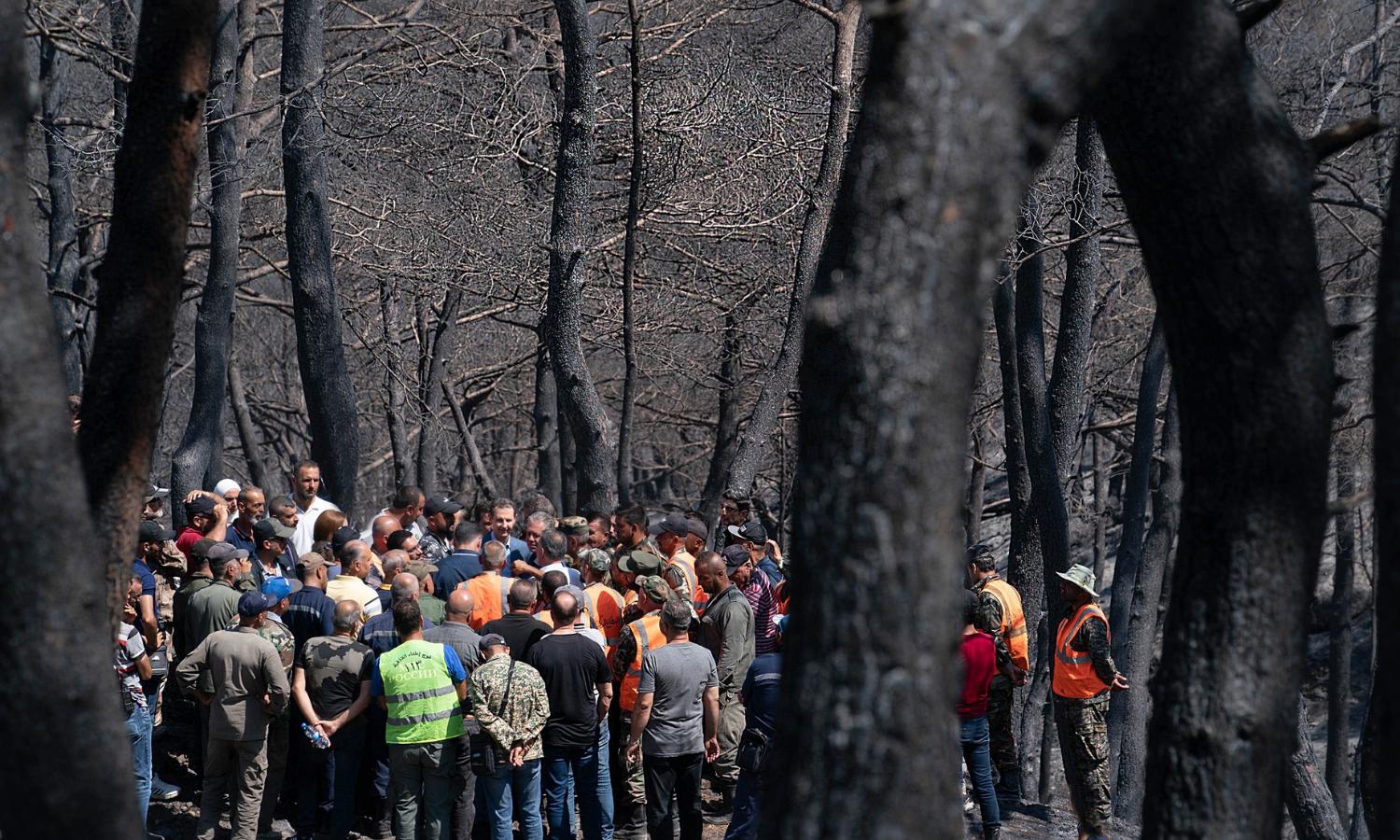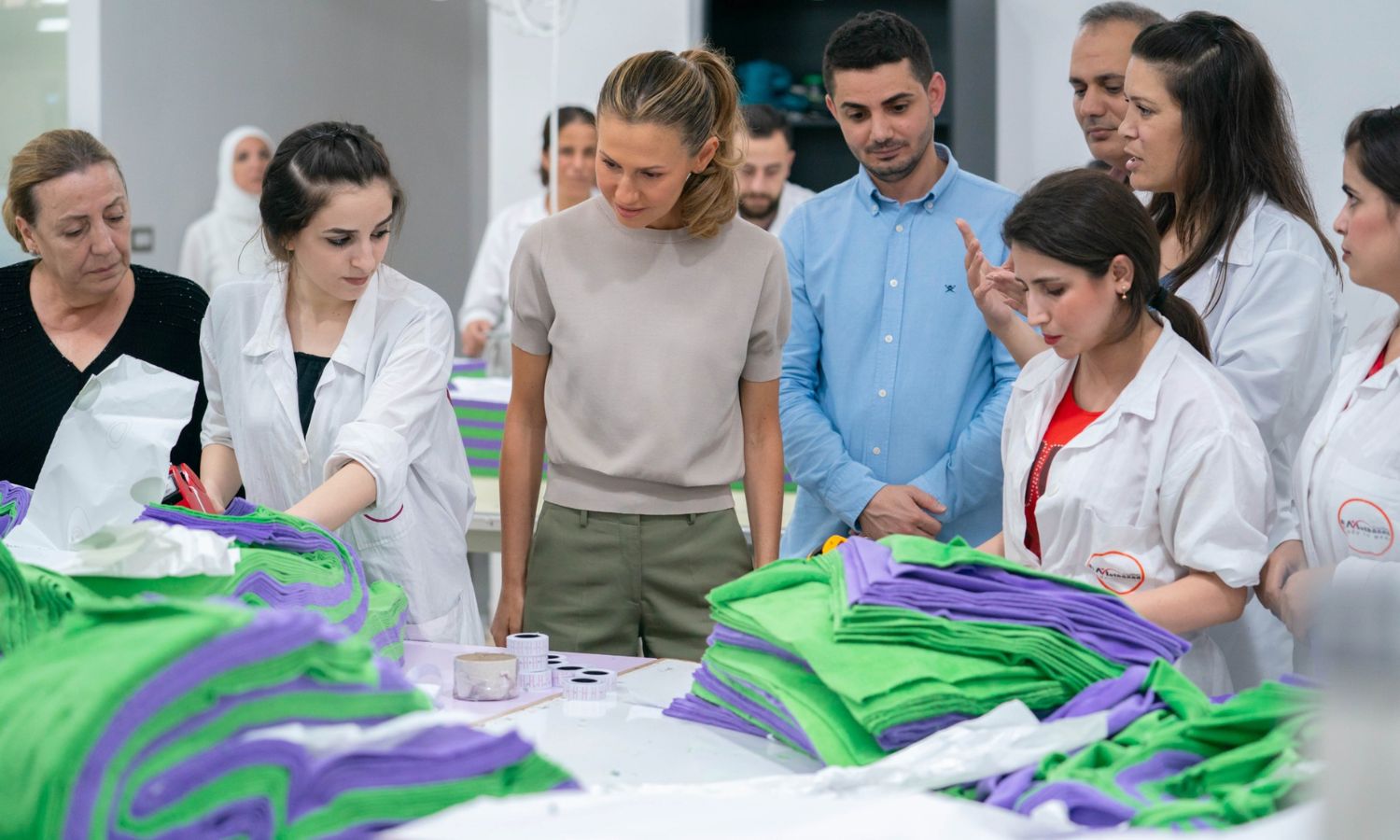



The visit of several government officials of the Syrian regime during the past week, starting with Bashar al-Assad and ending with the ministers, to the popular incubator areas on the Syrian coast coincided with the loud voices of criticism against the Assad regime on social media.
Al-Assad visited, on August 3, the new power plant in the city of Banias before the end of its construction and putting it into service, which will provide an initial production capacity of 24 megawatts, which is considered a small amount for the “national need,” as he said.
On the same day, al-Assad went to the newly established Syrian Photovoltaic Module Production Company in Latakia.
Al-Assad said during his meeting with the company’s employees, “It has been quite clear from now until many years coming that even if we generate traditional energy, we need large amounts of energy,” explaining that alternative energy will not replace traditional energy.
On his way to Latakia, al-Assad visited the sites of forest fires that the coastal governorate recently witnessed, praising the efforts of the Civil Defense and the army forces and saying that the public and private losses this year are less than previous years, as a result of “experience, speed, and determination.”
Al-Assad’s visit to the coastal areas was not individual. Rather, his wife, Asma al-Assad, moved separately through her visit to a clothing factory in the Tartus countryside, which she supported its launch in 2018 from a small workshop that includes 12 sewing machines and 18 workers to a factory that contains 500 machines, and provides 900 job opportunities for “the families of the martyrs and the wounded” in the region.
During the past week, several ministers arrived in service activities in the region, including the Minister of Agriculture, Mohammed Hassan Qatana, who followed the developments of the fires in Latakia, and the Minister of Housing, Suhail Mohammad Abdullatif in the same governorate to follow up on the implementation of the housing towers for those affected by the earthquake and the temporary housing units project that it is implementing by the Emirates Red Crescent Authority, and the visit of the Minister of Higher Education, Bassam Ibrahim to Tartus to inspect the Tartus University buildings projects.
The regions of Syria are generally experiencing an economic crisis in light of low salaries and purchasing power and high prices at the same time.
Most of the population relies on foreign remittances sent by their relatives outside Syria to help with living expenses, while the popular incubator in the coast suffers, in particular, because it is the least of the Syrian components linked to the displaced outside the country, according to analysts.
Nader Khalil, a fellow researcher at the Omran Center for Strategic Studies, told Enab Baladi that the Syrian regime’s movements in the coastal governorates are not new and that since 2018, it has shown special interest in the loyalist incubator in the Syrian coast because it is the “main human reservoir” through which it supplies the security and military forces, the most loyal to it.
In the past weeks, the regime’s moves to show its coastal priority have become “more urgent” after activists from that region published a series of simultaneous recordings criticizing the current living and service situation with an unusual ceiling of criticism, and in a way that expresses the non-acceptance of the status quo to unprecedented levels in the loyal incubator, according to Khalil.
In the last week of July, Syria-based journalist Lama Abbas appeared in a live broadcast on Facebook in which she criticized the regime’s government authorities and the living conditions. Similarly, the pro-regime activist, Bashar Barhoum, criticized government officials on his Facebook page.
The popular incubator suffers from a significant decline in purchasing power, as it is the least connected to the Syrian components (refugees) outside the country compared to other social groups that receive regular remittances, which constitute the “basic lever” for their livelihood.
The fellow at the Omran Center for Strategic Studies believes that the pro-regime popular incubator relied, during the past decade, on “looting and stealing” Syrians’ property, in a “systematic and deliberate” manner, at every intrusion and forced displacement of opposition areas.
The loyal incubator focused during the past years on taking positions in the regime circles and security forces or in government jobs and other institutions linked to the regime.
However, now the salaries of these sites and jobs are not enough for days due to the rapid collapse of the exchange rate of the Syrian pound, coinciding with the regime’s lifting of subsidies on most basic commodities and fuel, according to Khalil.
The political analyst, Hassan al-Naifi, told Enab Baladi that the more the economic crisis intensifies and the more “living misery” increases in Syria, the pro-regime incubator will recede, and the “complaint campaign” will extend to the nearest incubators in the coastal governorates.
Al-Assad wants, whether through his visit with his wife or through decrees he approved, to remedy this “rift that began to grow between him and his incubator,” according to al-Naifi.

Asma al-Assad, the wife of the head of the Syrian regime, visits a clothing factory in rural Tartus – August 6, 2023 (SANA)
On July 17, the Syrian regime approved several decisions that coincided with the state of criticism in the popular incubator, including the decision to end the retention of officers and reserve personnel for those whose service has reached 6.5 years or more.
The decision to release people from compulsory service in the regime forces is usually welcomed by the popular incubator through social media, as it is considered the “human reservoir” area.
On July 26, the “Jareeh al-Watan” (Wounded of Homeland) project announced a one-time financial grant that includes all the wounded from the regime and security forces and its affiliated militias, at a value of 400,000 Syrian pounds for the completely disabled, 350,000 Syrian pounds for the partially incapacitated, and 300,000 Syrian pounds for the partially disabled, while about a month had passed since the grant that preceded it.
($1=13,900 SYP) according to the S-P Today website, which covers the trading rate of the Syrian pound to the dollar.
Political analyst Hassan al-Naifi believes that in the absence of central economic policies to rectify the situation, most of these financial grants or visits are formalities because they are “instantaneous” and do not affect large segments of citizens.
According to al-Naifi, these types of “immediate remedies” will not enable the regime to redress the popular support, expecting that the state of discontent with the inability of the regime’s government to meet the citizens’ needs will expand.
This is what Nader Khalil, a fellow at the Omran Center for Strategic Studies, agrees with that the regime’s attempts to pacify its loyal incubator may not succeed by using these moves only, but rather it must use means of pressure on its side, such as the campaign of arrests that were reported in Latakia, and putting pressure on activists who have followers on social media to change their positions, as was evident in the change in the position of activist Bashar Barhoum.
On July 30, the local journalist, Lama Abbas, attacked the opposition media outlets, describing that they “exploited her speech” after a video recording she published about an attempt to arrest her by the security forces.
In addition to the regime’s traditional method of intimidating its supporters from the revenge of “other affected Syrian incubators during the past years.”
In addition to promoting an “anticipated new war” east of the Euphrates, between the Russian-Iranian axis, along with the regime, and the American axis, raising the slogan “No voice is louder than the sound of war,” according to Khalil.
After the video clips of criticism spread, the cousin of the regime’s president, Wassim al-Assad, appeared in a video clip in which he rebuked those who demanded that the regime take concrete measures at a time when the regime needed help and asked them in return to go to liberate the oil wells or to go to the United Nations to demand lifting the penalties.
if you think the article contain wrong information or you have additional details Send Correction